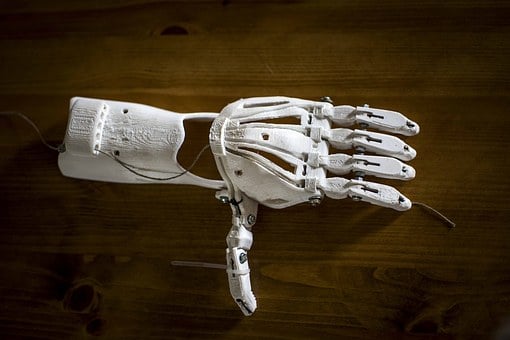
Roughly 13% of all 3D printing revenue comes from the medical industry. From prosthetics to surgical guides, there are a surprising number of medical applications for additive manufacturing technology. The flexibility offered by a 3D printing service lets medical professionals create patient-specific devices at an affordable cost.
The medical industry is already primed for additive manufacturing
Detailed scanning and imaging processes are a necessary part of the medical industry. Laser scanning is used to take detailed images of a subject's surface, while CT scanning and MRI imaging are used to achieve cross-sectional images of bones and tissue.
Modern software is able to turn these medical images into complete models that can be used for 3D printing. Devices that were once purely theoretical can now be produced quickly, cheaply, and effectively; thanks to the detail of the images, they always match the patient exactly as intended.
Manufacturing requirements for the medical industry
There are several reasons why additive manufacturing works perfectly for medical applications. An on-demand 3D printing service can be used to quickly manufacture medical devices for patients in need.
Complexity
- Complexity - Surgical implants require complex and organic structures to be accepted by the host tissue. These structures are prohibitively expensive with traditional manufacturing methods, but a 3D printer can create them with no additional cost.
Customization
- Customization - 3D printed parts can be shaped to fit perfectly with a patient's anatomy. Dental implants, cosmetic prosthetics, and even scale models can all be created to exact specifications.
Sterilization
- Sterilization - Medical devices must be made from sterilizable materials. Most of the materials used for FDM printing or 3D metal printing can be sterilized by steam autoclave or gamma radiation.
Speed
- Speed - Medical procedures seldom happen on a relaxed schedule. On-demand 3D manufacturing lets hospitals source necessary parts that can be completed with an acceptably short lead time.
Cost
- Cost - The flexible nature of additive manufacturing has greatly reduced the cost of custom medical devices. Individualized prosthetics and implants have now become a reality for patients across the world.
Common medical 3D printing applications
Additive manufacturing has been used to produce hearing aids, replacement limbs, surgical implants, and detailed models of organs, bones, and blood cells. Access to this technology has greatly advanced the potentials of the medical field.
Prosthetics - fully-functional replacement limbs
- Prosthetics - Additive manufacturing has completely revolutionized the prosthetics industry. From cosmetic prosthetics to fully-functional replacement limbs, these devices can be customized to each individual and produced for a fraction of the previous cost.
Surgical guides
- Surgical guides - Both dental and medical surgeries require extreme precision. A 3D printed guide can help a surgeon line up holes and incisions with a patient's anatomy. Thanks to additive manufacturing, these guides can be produced quickly and to exact specifications.
Implants
- Implants - Additive manufacturing has the ability to produce fine mesh structures at no additional cost. This feature is necessary for surgical implants; the organic structure of the device reduces the risk of rejection after the surgery is complete. These completely customizable implants are usually manufactured with 3D metal printing; the results are strong, sterile, and perfectly suited to the patient's needs.
Models
- Models - 3D printing can be used to create perfect scale models of patient-specific anatomy and structures. This allows doctors and nurses to study a subject from multiple angles and hopefully find a solution to the medical problem. Additive manufacturing is an affordable way to produce anatomical models; both medical students and experienced professionals take advantage of this technology.
As more applications are discovered, the impact of 3D printing on the medical industry has become truly astounding. 3D Hubs is proud to partner with medical professionals to offer on-demand prosthetics, implants, and surgical tools. Use the 3D Hubs online manufacturing tool to check design for viability and begin production on any custom part.